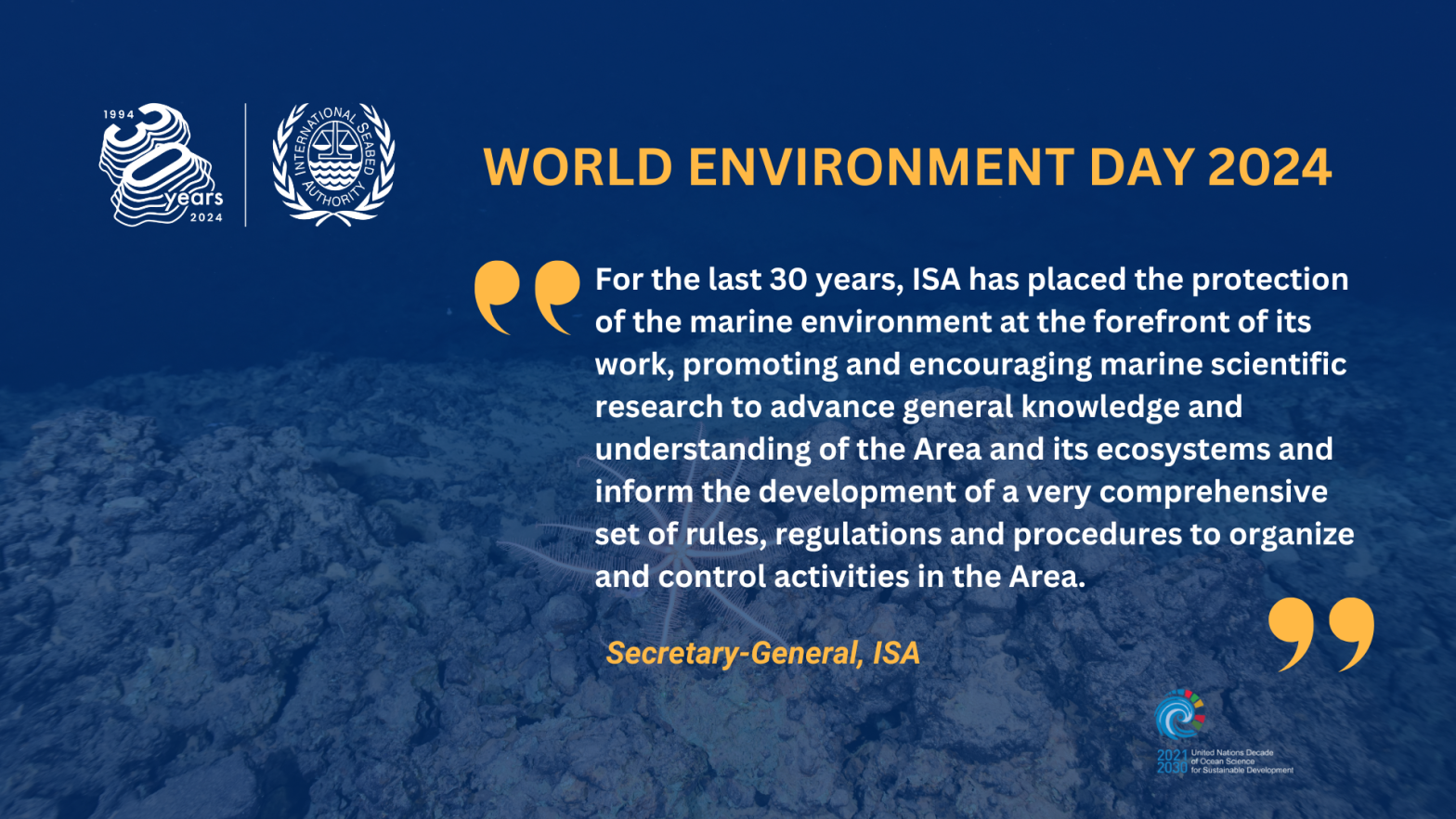On World Environment Day 2024, the International Seabed Authority (ISA) stands tall in its role of steward of the international seabed area (the Area) and its resources for the benefit of all humanity, a mandate entrusted to it by the United Nations Convention on the Law of the Sea.
For the last 30 years, ISA has placed the protection of the marine environment at the forefront of its work, promoting and encouraging marine scientific research to advance general knowledge and understanding of the Area and its ecosystems and inform the development of a very comprehensive set of rules, regulations and procedures to organize and control activities in the Area.
Since 2001, ISA exploration contractors have invested over USD300 million in environmental baseline studies, collecting extensive data on deep-sea ecosystems that contributed significantly to advancing our general understanding of this environment. In the Clarion-Clipperton Zone alone, scientists estimated that between 6,000-8,000 species inhabit the deep sea floor habitats, excluding microbes. The collective effort of ISA contractors and taxonomists has led to a fourfold increase in the number of described species for the region in five years (over 150 new taxonomic descriptions were published between 2015 and 2020).
Building on this endeavour, ISA launched in 2022 the Sustainable Seabed Knowledge Initiative (SSKI) to advance scientific knowledge of deep-sea biodiversity, facilitate capacity-building efforts for deep-sea taxonomy research and inform relevant decision-making processes for environmental management and protection.
With the financial support of the European Union, the Government of France and the Republic of Korea, SSKI established an interdisciplinary network of scientific institutions, international organizations and ISA contractors to spearhead activities on species cataloguing, data-sharing and developing tools for species identifications.
SSKI also focuses on facilitating taxonomic descriptions with a target of at least 1,000 new deep-sea species described by 2030. The “One Thousand Reasons” campaign launched in 2023 has awarded 10 grants to eight research institutions and two citizen scientists to describe nearly 100 species by the end of 2024.
The biological data generated through baseline surveys and SSKI activities, available through ISA’s open database, DeepData, is shared globally via the Ocean Biodiversity Information System, OBIS, of IOC-UNESCO, enabling inclusive and open access to interested scientists and the general public.
Additional Strategic partnerships, such as the one between ISA and the International Hydrographic Organization, have introduced AREA2030, a collective initiative to foster collaboration for high-resolution mapping in contribution to the SEABED2030 initiative.
Since 2012, ISA has also been leading the development and implementation of regional environmental assessments and management plans. This environmental information is public. Stakeholder participation is promoted to foster transparency and collaboration.
As trustee of 54 per cent of the world’s ocean seabed, ISA has successfully discharged its responsibilities over the 30 years of its existence, contributing significantly to the development of an international rule-based order in support of sustainable use and management of ocean commons.
On this World Environment Day, together with our Member States and all our partners, we remain more committed than ever to redouble our efforts to ensure that, collectively, the environmental protection of the Area remains at the core of our work to manage the invaluable resources of the deep sea sustainably. Through united actions, a prosperous and sustainable future for all humanity is achievable.
About ISA
ISA is an autonomous international organization mandated by the United Nations Convention on the Law of the Sea to protect the seabed for the shared benefit of humankind. ISA is committed to the principle that all nations of the world should benefit from responsible, sustainable and regulated economic activities in the deep seabed, including deep seabed mining and from the potential resources the deep seabed holds for a global green transition. The ISA works to ensure that the voices of all states and stakeholders, including developing states, civil society organizations and all ISA Member States, are effectively heard in discussions around the sustainable development of the deep seabed.
For media enquiries, please contact:
Mr. Philip Janikowski, Communications Specialist, ISA, pjanikowski@isa.org.jm


